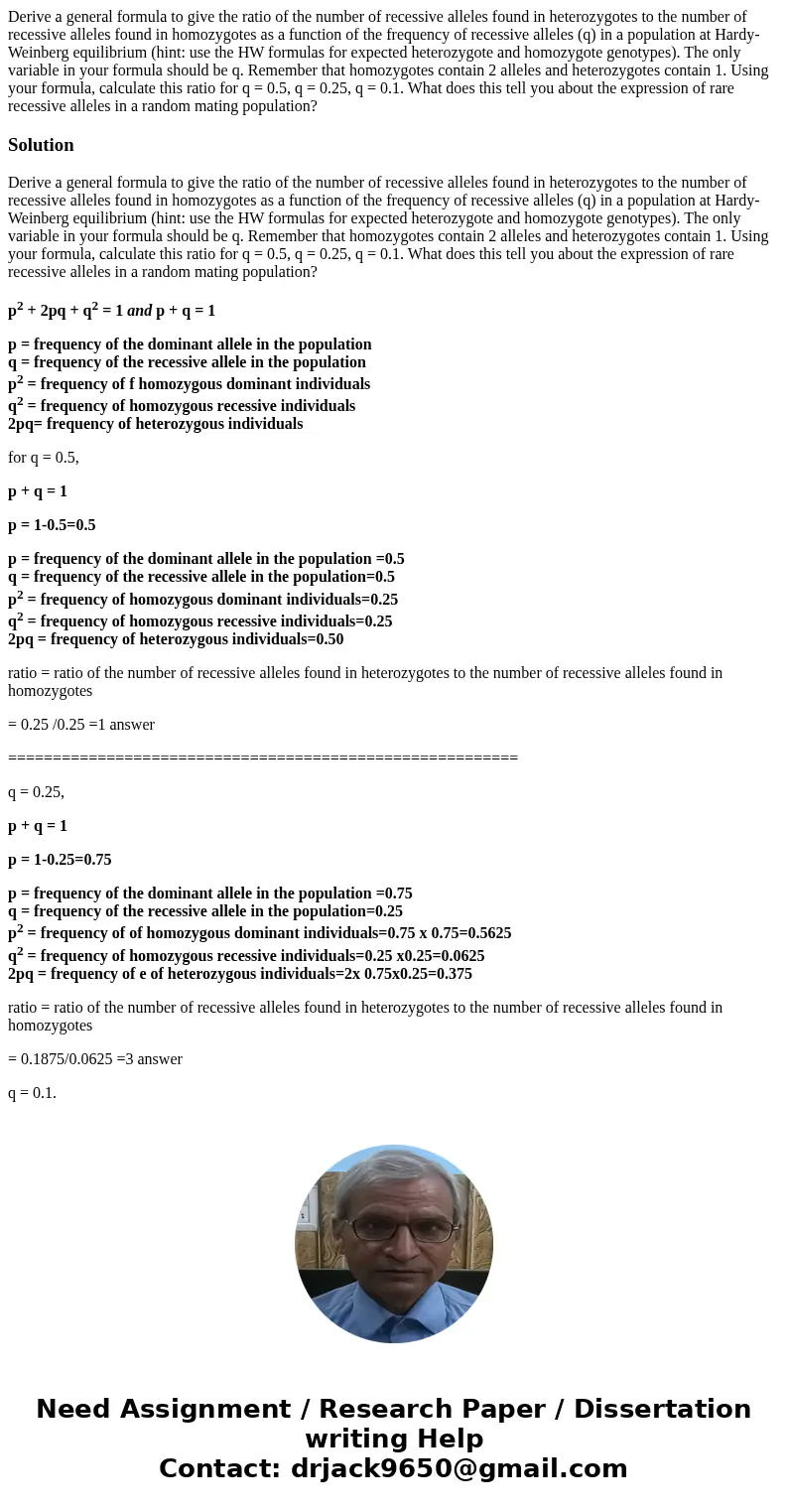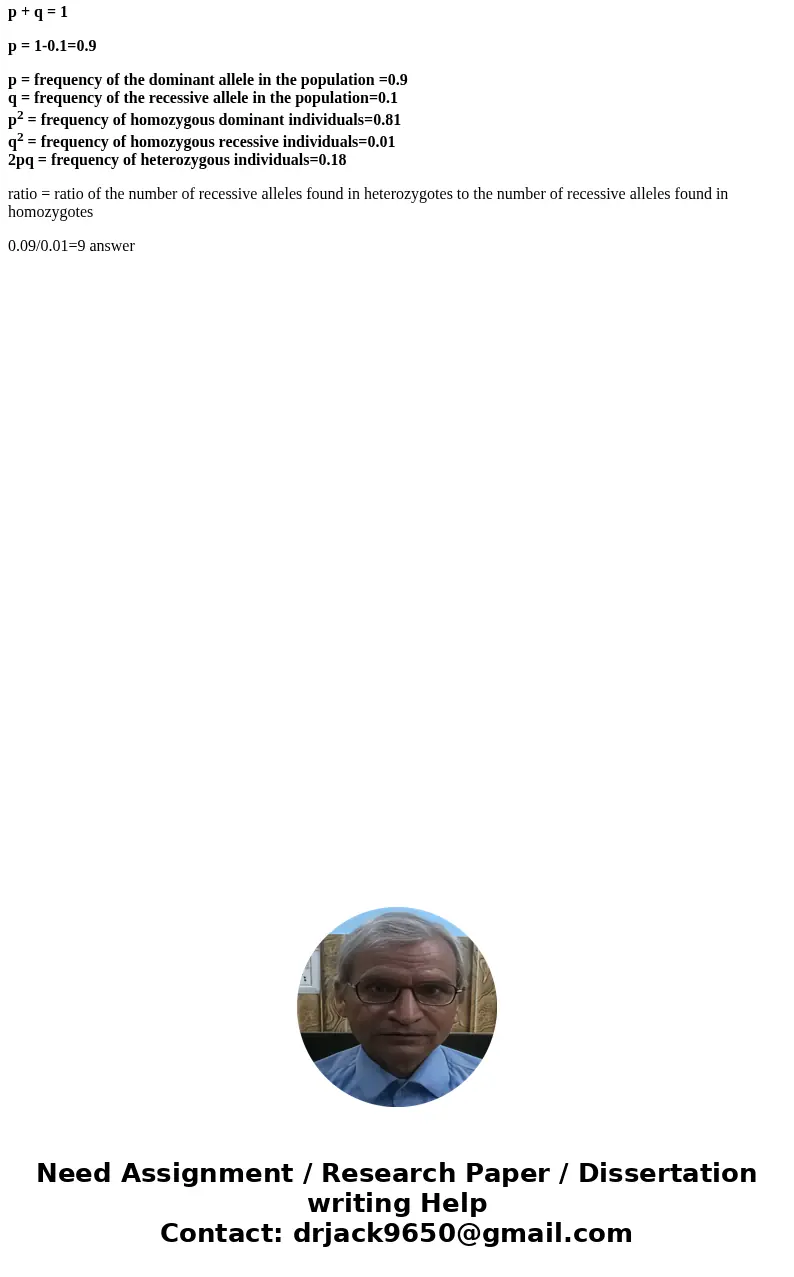Derive a general formula to give the ratio of the number of
Derive a general formula to give the ratio of the number of recessive alleles found in heterozygotes to the number of recessive alleles found in homozygotes as a function of the frequency of recessive alleles (q) in a population at Hardy-Weinberg equilibrium (hint: use the HW formulas for expected heterozygote and homozygote genotypes). The only variable in your formula should be q. Remember that homozygotes contain 2 alleles and heterozygotes contain 1. Using your formula, calculate this ratio for q = 0.5, q = 0.25, q = 0.1. What does this tell you about the expression of rare recessive alleles in a random mating population?
Solution
Derive a general formula to give the ratio of the number of recessive alleles found in heterozygotes to the number of recessive alleles found in homozygotes as a function of the frequency of recessive alleles (q) in a population at Hardy-Weinberg equilibrium (hint: use the HW formulas for expected heterozygote and homozygote genotypes). The only variable in your formula should be q. Remember that homozygotes contain 2 alleles and heterozygotes contain 1. Using your formula, calculate this ratio for q = 0.5, q = 0.25, q = 0.1. What does this tell you about the expression of rare recessive alleles in a random mating population?
p2 + 2pq + q2 = 1 and p + q = 1
p = frequency of the dominant allele in the population
q = frequency of the recessive allele in the population
p2 = frequency of f homozygous dominant individuals
q2 = frequency of homozygous recessive individuals
2pq= frequency of heterozygous individuals
for q = 0.5,
p + q = 1
p = 1-0.5=0.5
p = frequency of the dominant allele in the population =0.5
q = frequency of the recessive allele in the population=0.5
p2 = frequency of homozygous dominant individuals=0.25
q2 = frequency of homozygous recessive individuals=0.25
2pq = frequency of heterozygous individuals=0.50
ratio = ratio of the number of recessive alleles found in heterozygotes to the number of recessive alleles found in homozygotes
= 0.25 /0.25 =1 answer
=========================================================
q = 0.25,
p + q = 1
p = 1-0.25=0.75
p = frequency of the dominant allele in the population =0.75
q = frequency of the recessive allele in the population=0.25
p2 = frequency of of homozygous dominant individuals=0.75 x 0.75=0.5625
q2 = frequency of homozygous recessive individuals=0.25 x0.25=0.0625
2pq = frequency of e of heterozygous individuals=2x 0.75x0.25=0.375
ratio = ratio of the number of recessive alleles found in heterozygotes to the number of recessive alleles found in homozygotes
= 0.1875/0.0625 =3 answer
q = 0.1.
p + q = 1
p = 1-0.1=0.9
p = frequency of the dominant allele in the population =0.9
q = frequency of the recessive allele in the population=0.1
p2 = frequency of homozygous dominant individuals=0.81
q2 = frequency of homozygous recessive individuals=0.01
2pq = frequency of heterozygous individuals=0.18
ratio = ratio of the number of recessive alleles found in heterozygotes to the number of recessive alleles found in homozygotes
0.09/0.01=9 answer


 Homework Sourse
Homework Sourse